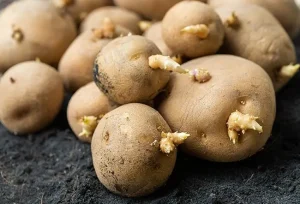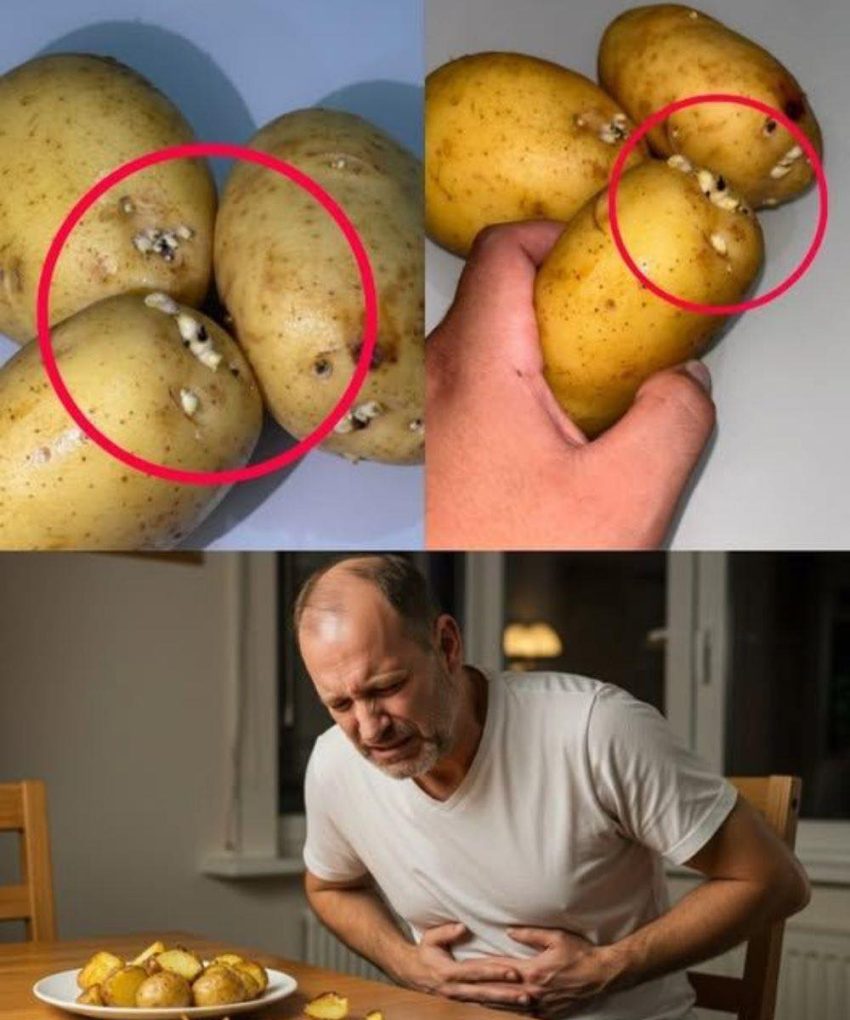Many people eat potatoes all across the world. They are quite handy and easy to use, therefore people all around the world use them in their kitchens. You may use them to make everything from plain mashed potatoes to crispy fries. A lot of people use them all the time because they are easy to cultivate, cheap, and last a long time. Potatoes are one of the safest and most common items in your cupboard, but not many people know that they can be hazardous for your health in certain situations.
When potatoes get older, especially if they aren’t stored right, they start to sprout. The little “eyes” on the surface of the tuber are where these sprouts come from. They may not look dangerous or even natural. This happens a lot, and it’s not a good thing. When a potato starts to grow, it goes through chemical changes that could make the flesh of the crop unsafe to eat. A lot of people don’t know that these sprouted potatoes can have a poison in them called solanine, which is bad for people even in little amounts.
All nightshades, such as tomatoes and eggplants, have solanine in them, which is a form of glycoalkaloid. But when potatoes are in the light, get damaged, or are stored for a long time, they make a lot more solanine. The substance protects the plant against bugs, predators, and disease. This chemical is wonderful for things outside, but not for cooking. The potato’s green spots, sprouts, and thin layer just below the surface are probably where the most solanine is.

Solanine, on the other hand, can handle heat, thus cooking won’t kill it. If you boil, fry, or bake a potato that has sprouted, the poison won’t go away. Peeling may make the concentration a little lower, but it usually doesn’t reach deep enough to get rid of the hazard completely, especially if the potato has turned green or the sprouts are fully grown. Solanine can make you feel sick even in small amounts, especially if you are already weak.
The signs of solanine poisoning can be mild or quite bad. Nausea, vomiting, stomach cramps, and diarrhea are some of the first signs that normally show up a few hours after eating something. Some people might also feel dizzy, have a fever, headaches, or a burning feeling in their throat. After eating a lot, people may have brain-related difficulties like confusion, seeing things that aren’t there, a slow heart rate, and, very rarely, seizures or other issues. There are medical papers about solanine poisoning, even if it doesn’t kill people very often.
Solanine is highly harmful for kids, pregnant women, senior adults, and anyone else whose immune system isn’t very strong. Their bodies tend to take in and react to poisons more quickly, so even small amounts of exposure can be more hazardous to them. Some people can get very sick from only a few bites of infected potatoes and need to see a doctor.

It’s not always easy to tell if a potato is safe to eat because solanine doesn’t have a significant taste or scent. There are clear symptoms, nevertheless, that you should pay attention to. If a potato has started to sprout, looks shriveled or mushy, has green spots on the skin, or smells rotten, it’s better to throw it away. Taking off the sprouts and green sections of the potato might not be enough to establish if it is safe. It’s always preferable to be safe and toss stuff away if you’re not sure.
Putting things away the right way is the first step you need to take to remedy the problem. A cool, dark, dry, and well-ventilated location is best for potatoes. When there is light, such sunlight or bright kitchen lights, the levels of chlorophyll and solanine rise. Solanine gives the skin its green hue. Never put potatoes in the refrigerator. Starches can turn into sugars when they get chilly. When you cook them at high heat, this changes the taste and makes it more likely that harmful chemicals will form.
Don’t use plastic containers since they keep moisture in and make food go bad faster. Instead, use paper bags or mesh baskets that let air through. Check your potatoes from time to time and utilize the older ones first so they don’t get bad. If you see one starting to blossom or get soft, take it out right away so it doesn’t spread to other plants nearby.
It’s tempting to cut off the bits that are developing and utilize the remainder, especially to cut down on food waste, but the health risks of solanine aren’t worth it, especially for families with kids or old people. The results could be anything from slight pain to a major sickness.
Potatoes are a common food, but like any other food that goes bad, they need to be taken care of. You can keep yourself and your loved ones safe from a health risk that is easy to see by learning how sprouting changes the chemicals in plants and how to spot warning signs. When you go to fetch the potato you forgot about at the bottom of the pantry, look at it closely. It may look safe on the outside, but what’s within may not be.
